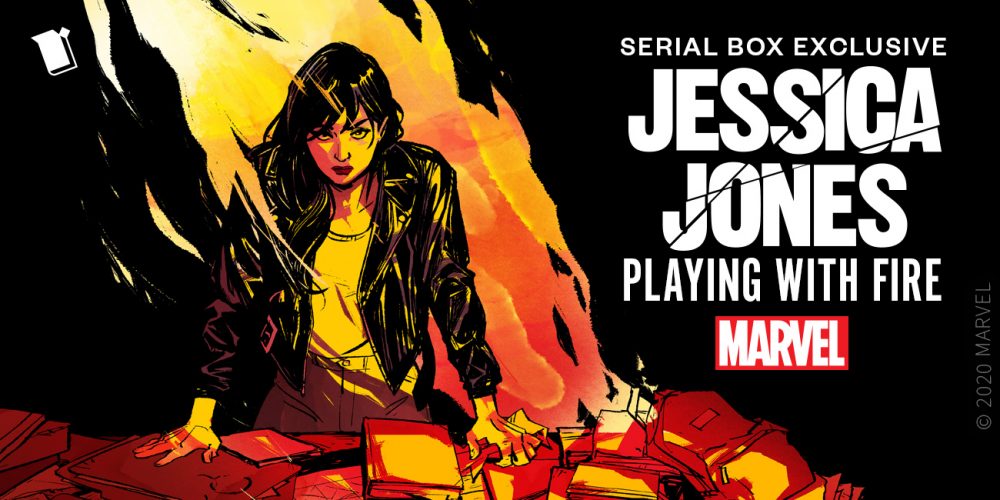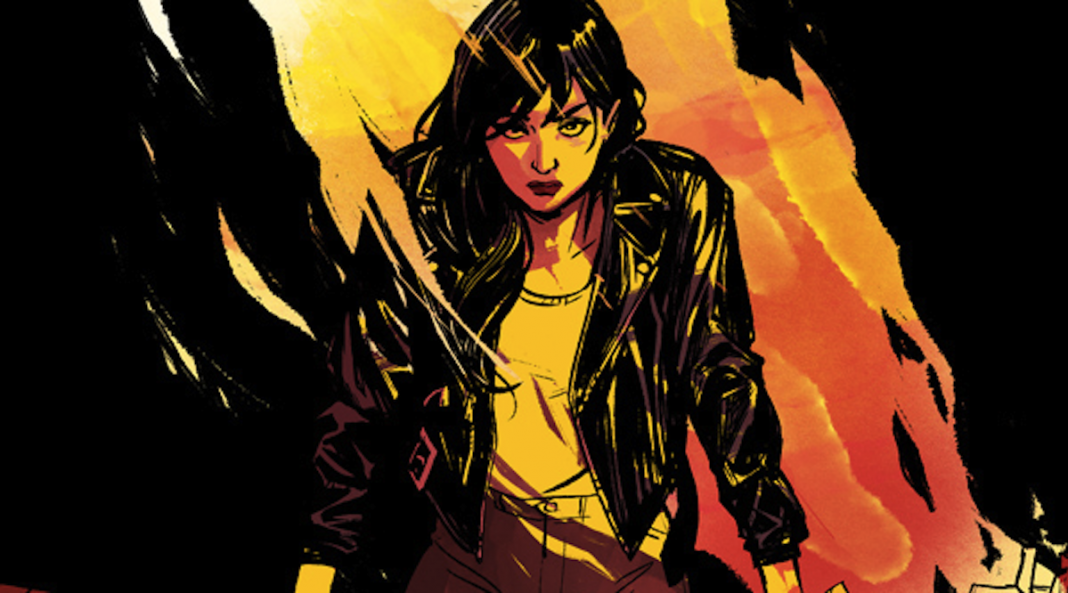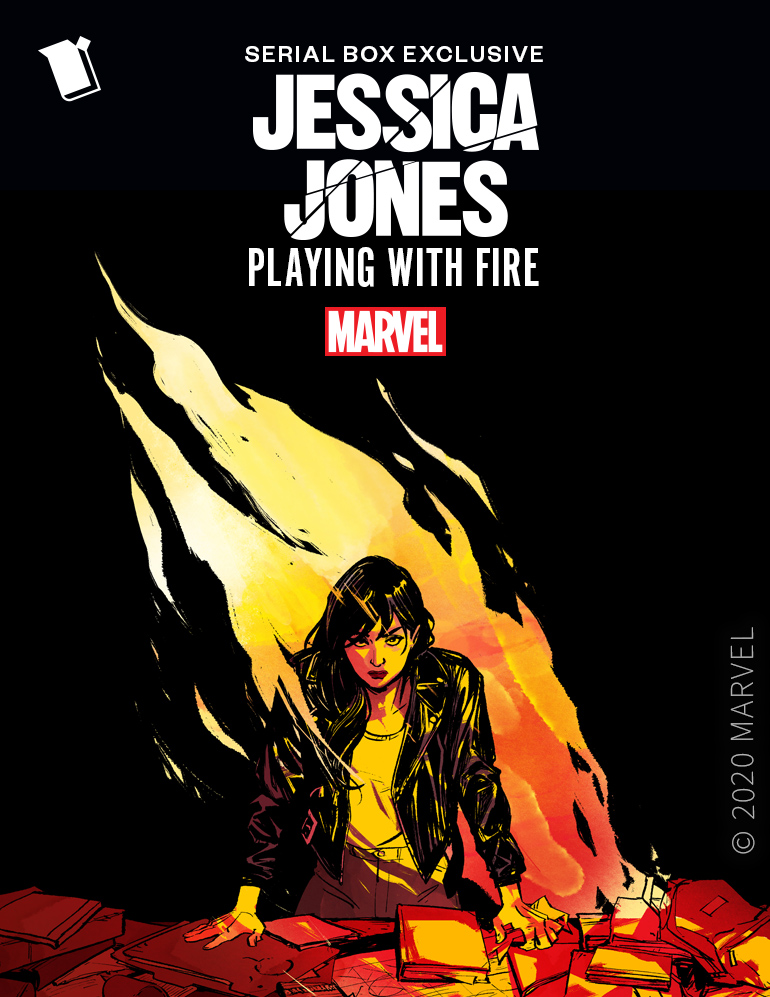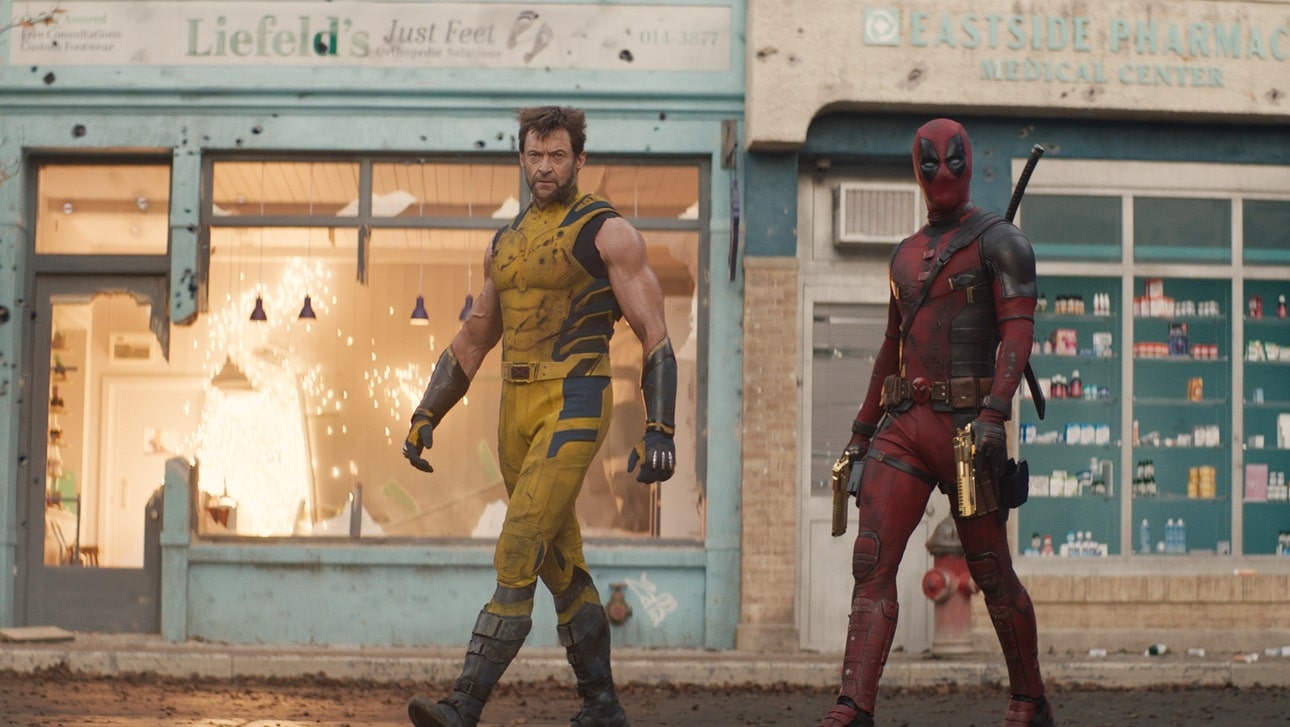Marvel’s Jessica Jones: Playing with Fire from Serial Box is a sixteen-episode serialized mystery that you can listen to or read either on your cell phone or through the Serial Box website. The first three episodes of Marvel’s Jessica Jones: Playing with Fire are available today, Thursday, May 28th, with new episodes appearing weekly going forward.
Written by Vita Ayala, Lauren Beukes, Sam Beckbessinger, Zoe Quinn, and Elsa Sjunneson, narrated by Fryda Wolff, and featuring cover art by Annie Wu, the story follows super-powered detective Jessica Jones as she investigates another case in the Marvel universe while simultaneously trying to be just a smidge healthier in her coping mechanisms (guess which one ends up proving more difficult for her). Whether you’re most familiar with Jessica from the Netflix series or from her comic book appearances, you’ll immediately feel at home with the indefatigable detective in Marvel’s Jessica Jones: Playing with Fire.

From their home in Brooklyn, Ayala spoke with the Beat about their rituals for writing Jessica, what they’ve been reading lately, and the importance of including queer representation in Marvel universe stories!
AVERY KAPLAN: Do you have a favorite Jessica Jones story?
VITA AYALA: That’s a good question! There have been so many and they are wildly different.
I’ve been drawn to stories that are a little more street-level with her. I know that she also is a superhero and she has all those cool powers, but I like when she gets down and dirty, and does that kind of thing.
I will say that the latest that I really enjoyed with her in it that wasn’t necessarily a comic book, I was playing the Marvel Ultimate Alliance 3 game, and she’s in it, and I was like, “Okay, that’s what I want. I just want to play as Jessica Jones.”
KAPLAN: Were there any other detective stories that were especially influential in the writing of Marvel’s Jessica Jones: Playing with Fire?
AYALA: I’m a big fan of the noir, crime, and cybercrime genres, and so I’m always taking in stuff like that. At that time, I was re-reading either The Big Sleep or A Simple Case of Murder, and then also, I was re-reading a bunch of William Gibson stuff, the short story collection that “Johnny Mnemonic” is in. Probably William Gibson stuff and Raymond Chandler stuff in general.
And having nothing to do with the fact that I’m working for the company: I was listening to Ninth Step Station, because that’s one of my new favorite crime and cyberpunk things of all time. It’s so good.
KAPLAN: What’s the process of writing a Serial Box series like? How does it differ from writing a comic?
AYALA: One of the things that is wildly different to writing comics about Serial Box is that – at least for this project – it was like a writer’s room kind of deal, so it was run much more like a serialized drama series that’s more traditionally on television.
So we got together and we had a summit and we hashed things out together, and when we separated to write, we still were touching base with each other constantly. Which was really awesome, because writing prose and comics can be very lonely. So that was something that was very, very different.
Another was that when you’re writing a comic book, the document that you’re producing is meant to be for the artist. You’re not communicating with the final reader: your reader, as the writer of the comic book, is the artist. And so you have a very different language. For me, it’s much more conversational. I do go into tone when I’m writing comics, but much more in the way that I am talking to a collaborator as opposed to the person who will be reading the finished project.
So when writing, even though there’s a rigorous editing process and we check in with each other as writers, kind of laterally, writing the prose I had to keep in mind, “Whatever the editing that happens to the document, this essentially is it. This is what people will read.”
And then also, I had to kind of think about other senses, like sound, and areas in the prose that could either indicate what cool sounds they could use or ultimately whatever they decide to use as music or sound effects could enhance that through the prose itself, which is not something that I have to worry about in comics. In comics I’m like, “I don’t know, some sort of SFX here, man. Boom! Zow! Like, whatever.” My scripts are so casual!
KAPLAN: How is the Serial Box format especially well suited for mystery?
AYALA: Let me give a little context: I am a huge fan of audiobooks, and kind of audio radio play dramas. I loved The Shadow when I was growing up, and I listened to all kinds of audio serialized stuff. So to me, I always think about the cool stuff that you could do with the form in that way.
I think one of the ways that Serial Box kind of goes above and beyond is that they think about sounds and the folly effects and all that kind of stuff at a deeper level. They really do a lot to create atmosphere, and to immerse people in whatever they’re reading or listening to.
One of the things you don’t get in comics is music and atmosphere through sound. That’s something you can play with in film that is, to me, vital. So to have an almost hybrid where you have the written word but you also get that unconscious playing with people’s minds – I think it’s perfect.
And then having it be this serialized format of episodes, I think that you can play with where you lead the story in a way that you don’t even necessarily get with novels any more. You used to when they came out in chapters, but now you get the whole book and you can immediately – if you want to, like my mother does, which has stressed me out my entire life, you can read the last page first.
KAPLAN: Oh, no…
AYALA: (Laughs) It’s very stressful for me. And she’s a huge mystery person, so it’s pretty wild! But with this, you are experiencing the story in a way that it’s almost like you are the main character, which I think is really cool.
KAPLAN: I don’t get the last page thing…
AYALA: Oh, you want to hear something real upsetting? My mom reads the last sentence, then the last paragraph, then the last page, then the last chapter, and then goes to the beginning. She read Game of Thrones by character! She’s wild.
The Serial Box format was specifically made to thwart my mom, which I very much appreciate.
KAPLAN: Why is it important to include queer characters in Marvel stories?
AYALA: I mean, I think it’s important for multiple reasons. One, queer people exist. And so, to have stories without them makes absolutely no sense to me. Like… We’re everywhere. It feels like a glaring omission not to have queer characters in a story, because that’s what the world is like. Queer people exist.
Two, queer people enjoy reading stories and watching movies and just, taking in story, and so to not include queer characters would be – I know what it feels like. It feels very bad. It feels like you’re not seeing yourself. And there’s a certain level of pain associated with that. So to be able to alleviate that pain and be more authentic to life is remarkable. It’s both revolutionary and a “no duh.”
And then Marvel, being one of the most recognizable universes, whether it be comics or their novelizations or movies or whatever, across the planet, to have representation in that magnifies those other two things a million-fold. And I’m a person who truly does believe that exposure to something allows you to incorporate it into your worldview.
When I was in college, back at the dawn of time, I was a lot of people’s first black friend and first out queer friend, and I was like, “How? How is that possible?” I went to college in a rural area and a lot of rural people went there… And I was like, “How could you possibly move through worlds and not experience these things?”
And I realized, “I’m from New York, where it’s like, everywhere.” Including queer people and brown people and marginalized people in general into media that is broadcast across the planet means that more people are being exposed, and I think in positive ways. And by positive, I mean in more authentic ways.
KAPLAN: Listeners and readers of Marvel’s Jessica Jones: Playing with Fire get a glimpse of what communes might look like in the Marvel universe. What was the process of developing a super-powered commune like? Did you have any specific inspiration?
AYALA: It was a lot of fun, actually! We were all immediately were like, “Ooh, what does it look like? What does it sound like? What’s going on? What does it taste like? What do they do?” And we actually fell down a couple of rabbit-holes that we then ended up covering up with dirt, because we were like, “No, that’s too much.”
But we definitely did take inspiration from some of the established commune stuff in the Marvel lore, because you don’t want to reinvent the wheel, what you want to do is make the shiniest version. And I think that we also just, we’re trying to get at what would sensible and attractive to people. Me and all my comics friends always joke about joining a comics commune, and it’s like, “Okay, why do we talk about that? Why do we say that, and what would entice us to actually go through with it?” And so that was at the heart of it.
KAPLAN: While still avoiding spoilers, the central mystery in Marvel’s Jessica Jones: Playing with Fire involves an inter-generational conflict. Was it important to include this theme?
AYALA: I think what we did was we came up with a mystery, and then realized that was a central component. And we were like, “That’s great that we happened upon it, now let’s support that.” So it’s almost like we got there backwards.
KAPLAN: Did you have any rituals for getting into the right headspace to write Jessica?
AYALA: (laughs) Am I allowed to say I drank a shot of whiskey before I started writing? I don’t know if I’m allowed to say that!
I would re-read all of the documents that we had thus far. Whether it was creating my chapter from scratch or revising a chapter, I would re-read everything. I would have a little bit of whiskey, I feel like that’s just central to Jessica’s vibe.
And sometimes I would listen to a playlist I made for myself, so I put that on when I was writing and that got me more into the headspace. I love Jessica, she’s one of my favorite characters, she’s pretty wild.
KAPLAN: How have you been spending your free time during social distancing?
AYALA: I’ve been working a lot! I’ve also been pretty sick the last week, so I’ve been in recovery. Mostly laying down and reading comics.
I am lucky enough to be social distancing with my wife, so we’ve been spending a lot of time together, cooking together. We live in what was once a mansion but is now a tiny apartment – like it was segmented into tiny apartments, it’s in Brooklyn – so we have a very small backyard area where we can barbeque. It’s like ten by twenty – not even twenty.
We’ve been spending time together, I’ve been trying to read more – you know, I was working a lot the past few years, so I didn’t get a chance to enjoy the things that I enjoy, like reading comic books and reading novels and reading craft books. So I’ve been trying to do that stuff.
KAPLAN: Have you read any comics or books lately that you’ve especially enjoyed?
AYALA: Yes! I am almost done reading Thrill Me: Essays on Fiction by Benjamin Percy, which is a book about writing. He writes Wolverine and X-Force right now, as well as having written many novels that are all really good. And this book is weird in that not only does he gives a lot of good advice – and even when I don’t agree with him, necessarily, I’m like, “That’s still good advice” – but also, it reads like a thriller novel! So you’re sitting there like, “I just want to see what happens next in this thing that’s supposed to be teaching me to write.”
I’ve been reading a lot of comics. Recently I finished Dead Eyes by Gerry Duggan and John McCrea, which was great. A good crime book. I’ve been re-reading a bunch of DC stuff. I’m a huge Birds of Prey fan, so I’ve been re-reading all the stuff from the late 90s/early aughts.
I was like, “I’m gonna pay comic book stores to send me books.” So I got a couple of shipments that were pretty cool – I got The Long Con by Ben Coleman and Dylan Meconis from Oni Press, and that one’s really great, too.
KAPLAN: Do you miss conventions? Do you have any con story you’d like to share?
AYALA: I do, I do miss conventions. Last year I did too many, and I was like, “This year I’m only going to do three.” And it turns out, I only did one!
This year was my first year going to C2E2 which was a phenomenal show, I absolutely adored it. Basically all the X-Men writers went out, and we had a great time. My birthday was spent out there, and Leah Williams and Tini Howard got a group together for karaoke, which included Al Ewing. So I don’t know if you know Al Ewing at all, or what he sounds like, but it’s delightful.
And hearing Al Ewing sing “Torn” by Natalie Imbruglia and “Kiss from a Rose” by Seal on my birthday was one of the greatest gifts… And I spent like five full days just constantly around Tini and Leah, who are two of my absolutely best friends. That was really one of the best cons I’ve had in a really long time.
I miss conventions in general because I like comic books. I’m fulltime freelance, I have been for about two years now, which means that I don’t go out and go to my job, I just am at my job wherever I am. So it’s pretty lonely, and conventions are an excuse to go see your friends! And you get to spend time together and stay up way too late – I’m too old to be staying up late, but we stayed up late and we talked every night. And I was like, “Oh my god, human interaction!”
And a reminder of why I love comics so much. I have a bunch of friends who are in comics – in comics press, and that kind of stuff – and it feels so good to talk to people, talking about the things we love, instead of yelling about things on Twitter.
So yeah, I miss cons. I will not be going to any until at the earliest next year, but I miss them.
KAPLAN: Is there anything else you’d like me to include?
AYALA: I feel like one of the things that is really important to me when talking about this project is just how incredible it was to work in the writer’s room, and how much fun I had with Lauren and Elsa and Zoë.
The kind of richness that comes from being able to be in a room where people have different levels of experience, like I have more experience with the Marvel side but Lauren and Elsa have a ton of experience with prose. And Zoë comes at it from another angle, not only having a lot of experience with comics but also in tech and gaming and all this kind of stuff. So to be able to sit in a room with people and have different levels of experience but everyone is shown the same level of respect and everyone’s voice is heard is really incredible. I’m really grateful for that.
The first three chapters of Marvel’s Jessica Jones: Playing with Fire are available for free in its entirety on Serial Box right now!








